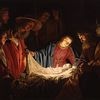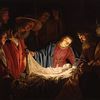Bloggfærslur mánaðarins, ágúst 2009
10.8.2009 | 13:18
Er brotthrifningin (rapture) Biblíuleg?
 Nokkrar kristnar kirkjur kenna það sem kallað er "brotthrifningin" eða "the rapture". Í stuttu máli þá kennir þessi hugmynd það að Kristur komi aftur en í laumi og taki burt alla kristna. Í gífurlegri ringulreið þá munu miljónir manna hverfa. Föt þessa fólks verða skilin eftir, bílar og flugvélar munu allt í einu verða stjórnlaus af því að ökumaðurinn var kristinn og var "tekinn" eða hrifinn á brot.
Nokkrar kristnar kirkjur kenna það sem kallað er "brotthrifningin" eða "the rapture". Í stuttu máli þá kennir þessi hugmynd það að Kristur komi aftur en í laumi og taki burt alla kristna. Í gífurlegri ringulreið þá munu miljónir manna hverfa. Föt þessa fólks verða skilin eftir, bílar og flugvélar munu allt í einu verða stjórnlaus af því að ökumaðurinn var kristinn og var "tekinn" eða hrifinn á brot.
Er hægt að finna þetta í Biblíunni? Ég segi nei; Biblían kennir þetta alls ekki. Aðal versið sem notað er til að styðja þessa hugmynd er að finna í fyrra Þessalóníkubréfi 4. kafla.
Fyrra Þessaloníkubréf 4
17Þá munum við sem eftir lifum verða hrifin burt ásamt þeim í skýjum til fundar við Drottin í loftinu. Og síðan munum við vera með Drottni alla tíma
Samkvæmt kenningunni þá gerist þetta og aðrir eru skildir eftir og þurfa að kljást við sjö ár af erfiðleikum áður en síðan Kristur kemur enn aftur. Ef við hægum aðeins á okkur og lesum orð Páls í samhengi þá sjáum við að þetta stenst ekki.
Fyrra Þessaloníkubréf 4
16Þegar Guð skipar fyrir, þegar raust erkiengilsins kveður við og básúna Guðs hljómar, mun sjálfur Drottinn stíga niður af himni og þau sem dóu í trú á Krist munu fyrst upp rísa
Áður en Páll talar um að fólk Guðs verði tekið þá segir hann að það gerist við endurkomuna og það mun vera hávær atburður eða eins og textinn segir "básúna Guðs hljómar". Ég get ekki séð nein vers í Biblíunni sem styðja að Kristur komi tvisvar, einu sinni hljóðlega þegar enginn sér og tekur burt fólk sitt og síðan aftur en þá með miklum látum. Ég sé aðeins eina endurkomu og henni er alltaf lýst sem mjög mikilfengum atburði.
Annað vers sem menn nota til að styðja þessa hugmynd um brotthrifningu eru orð Jesú sjálfs um endurkomuna en þau eru að finna í Matteusarguðspjalli 24. kafla.
Matteusarguðspjall 24
Eins verður við komu Mannssonarins. 40Þá verða tveir á akri, annar mun tekinn, hinn eftir skilinn. 41Tvær munu mala á kvörn, önnur verður tekin, hin eftir skilin
Hérna þarf maður aftur að hægja á sér og lesa það sem Jesú segir í samhengi og ekki missa af neinu. Í þessari ræðu þá varar Jesú fjórum sinnum við blekkingu á þessum tímum svo fyrir hinn kristna þá er hér ástæða til að staldra við og skoða vel hvað Kristur er að segja. Það sem kemur fram mjög skýrt er að endurkoman verður mjög sýnilegur og stórkostlegur atburður. Enn fremur kemur fram að við eigum ekki að trúa því að Jesú sé kominn og Hann er í eyðimörkinni eða sé í leyndum.
Matteusarguðspjall 24
23Ef einhver segir þá við yður: Hér er Kristur, eða: Þar, þá trúið því ekki. 24Því að fram munu koma falskristar og falsspámenn og þeir munu gera stór tákn og undur svo að þeir gætu leitt hin útvöldu afvega ef það er unnt. 25Athugið að ég hef sagt yður það fyrir.
26Ef menn segja við yður: Hann er í óbyggðum, þá farið ekki þangað. Ef þeir segja: Hann er í leynum, þá trúið því ekki. 27Mannssonurinn kemur eins og elding sem leiftrar frá austri til vesturs.
Athyglisvert að segja "Hann er í leynum þá trúið því ekki"; nærri því eins og að segja að ef einhver talar um leynda endurkomu þá eigum við ekki að trúa því en það er akkúrat það sem brotthrifningar hugmyndin kennir. Enn og aftur þá sjáum við lýsinguna á endurkomunni þannig að hún er mjög sjánleg og hávær sem útilokar marga sem segjast hafa verið Kristur eins og Bahá'u'lláh gerði á sínum tíma.
 Þeir sem vilja ýtarlegri umfjöllun um þetta efni þá mæli ég með þessari grein hérna: "The rapture, is anything missing?"
Þeir sem vilja ýtarlegri umfjöllun um þetta efni þá mæli ég með þessari grein hérna: "The rapture, is anything missing?"
Sömuleiðis þá gætu einhverjir haft gaman af mynd sem fjallar um hvað gerist rétt fyrir endalokin, sjá: Atburðir endalokanna
Trúmál og siðferði | Breytt 11.8.2009 kl. 14:12 | Slóð | Facebook | Athugasemdir (11)
10.8.2009 | 11:27
Loksins eitthvað annað en Álver!
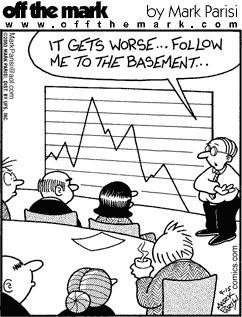 Þetta eru gleðitíðindi fyrir mig. Svo lengi hefur það farið í taugarnar á mér þetta endalausa álvera rugl. Svo einstrengingslegt að líkja má við þráhyggju.
Þetta eru gleðitíðindi fyrir mig. Svo lengi hefur það farið í taugarnar á mér þetta endalausa álvera rugl. Svo einstrengingslegt að líkja má við þráhyggju.
Það væri áhugavert að sjá hvort við sem þjóð gætum ekki bara grætt á því að selja raforkuna eitthvert annað en í þessi álver sem við höfum núna þar sem við virðumst vera bara að gefa þeim orkuna og fá afskaplega lítið í staðinn.
Að nota raforkuna í eitthvað annað en álver tel ég vera stórt skref í rétta átt!
( myndin er bara upp á punt, þó að hægt er að ímynda sér að þetta er það sem mun gerast ef fleiri raforkuver væru byggð til að skaffa fleiri álverum orku )

|
Samningur um gagnaver tilbúinn |
| Tilkynna um óviðeigandi tengingu við frétt | |
9.8.2009 | 16:48
Tónleikar New England Youth Ensemble og Óperukórsins
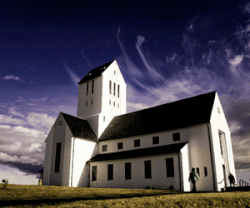 New England Youth Ensemble er sinfóníu hljómsveit sem var stofnuð af Virgina-Gene Rittenhouse fyrir hátt í þrjátíu árum síðan. Hljómsveitin er skipuð aðalega ungu fólki og hefur spilað víða, þar á meðal í Carnegie Hall í New York.
New England Youth Ensemble er sinfóníu hljómsveit sem var stofnuð af Virgina-Gene Rittenhouse fyrir hátt í þrjátíu árum síðan. Hljómsveitin er skipuð aðalega ungu fólki og hefur spilað víða, þar á meðal í Carnegie Hall í New York.
Miðvikudagskvöldið 12. ágúst nk. kl. 20.00 heldur Óperukórinn í Reykjavík og hljómsveitin New England Youth Ensemble tónleika í Skálholtsdómkirkju.
Stjórnandi er Garðar Cortes. Einsöngvarar eru Garðar Thór Cortes, Fjóla Kristín Bragadóttir, Ingibjörg Ólafsdóttir, Hallveig Guðmundsdóttir, Aron Axel Cortes og Bragi Jónsson. Tónleikarnir eru endurteknir daginn eftir í Langholtskirkju kl. 20.00. Aðgangur er ókeypis í Skálholti en í Langholtskirkju kostar kr. 3000.- inn á tónleikana.
Á tónleikunum mun kórinn og hljómsveitin flytja The Vision of the Apocalypse eftir Rittenhouse. Ég heyrði þau spila í Aðvent kirkjunni síðasta hvíldardag og það var virkilega flott. Sé eftir því að hafa ekki reynt að auglýsa þann viðburð en núna reyni ég að bæta fyrir það.
Trúmál og siðferði | Breytt s.d. kl. 16:53 | Slóð | Facebook | Athugasemdir (0)
9.8.2009 | 16:33
Bart Ehrman og William Lane Craig
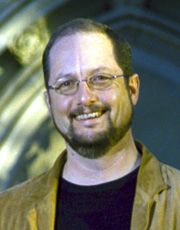 Af og til þá nefna þeir sem efast um áreiðanleika guðspjalla Nýja Testamentisins mann að nafni Bart Ehrman og að þar sé maður sem geti sýnt hve óáreiðanlegt Nýja Testamentið er.
Af og til þá nefna þeir sem efast um áreiðanleika guðspjalla Nýja Testamentisins mann að nafni Bart Ehrman og að þar sé maður sem geti sýnt hve óáreiðanlegt Nýja Testamentið er.
Mig langar þess vegna að benda á myndband þar sem Bart Ehrman rökræðir við heimspekinginn William Lane Craig um áreiðanleika Nýja Testamentisins, sjá: http://video.google.com/videoplay?docid=5545009691527182498
 Enn fremur langar mig að benda á bréf þar sem Craig var beðinn um að svara spurningum sem viðkomandi aðila fannst Craig ekki svara í umræðunni við Ehrman, sjá: Subject: Inerrancy and the Resurrection
Enn fremur langar mig að benda á bréf þar sem Craig var beðinn um að svara spurningum sem viðkomandi aðila fannst Craig ekki svara í umræðunni við Ehrman, sjá: Subject: Inerrancy and the Resurrection
Trúmál | Slóð | Facebook | Athugasemdir (0)
6.8.2009 | 15:27
Kærum þau fyrir landráð!
Mér finnst engann veginn nóg að skoða þessi mál þannig hvort að lög voru brotin eða ekki. Það þarf líka að meta hvort að það sé í lagi að setja sjálfstæði þjóðarinnar í hættu með glæpsamlegu athæfi og mér finnst það liggja fyrir að margir í þessu máli eru sekir um slíkt. Samviska þeirra á að segja þeim að það er rangt að stela, þó að það er hægt að gera slíkt á einhvern fáránlegan "löglegan" hátt. Að venjulegt fólk hafi tapað öllu, atvinnunni og jafnvel húsnæðinu og sparifénu en þetta lið sem stóð í þessu fái að valsa um hér frjálst ferða sinna; jafnvel mold ríkt í þokka bót er engann veginn í lagi.
Ég fyrir mitt leiti segi að það á að hirða allt af þeim og stinga þeim í steininn! Þá hefði lögreglan eitthvað gáfulegt að gera í staðinn fyrir að elta blanka listamenn.

|
Sást skvetta málningu á húsið |
| Tilkynna um óviðeigandi tengingu við frétt | |
4.8.2009 | 14:14
Svör við gagnrýni ( Answers to objections )
 Árið 1952 gaf maður að nafni Francis D. Nichol út bókina "Answers to objections". Þetta er bók sem fer yfir ótal rök gegn trú aðventista, allt frá hvíldardeginum til trú á sköpun. Mig langar að benda á þessa bók bæði fyrir aðventista og þá sem vilja kynna sér trú Aðvent kirkjunnar. Hérna er hægt að ná í bókina á pdf formati, sjá: Answers to objections
Árið 1952 gaf maður að nafni Francis D. Nichol út bókina "Answers to objections". Þetta er bók sem fer yfir ótal rök gegn trú aðventista, allt frá hvíldardeginum til trú á sköpun. Mig langar að benda á þessa bók bæði fyrir aðventista og þá sem vilja kynna sér trú Aðvent kirkjunnar. Hérna er hægt að ná í bókina á pdf formati, sjá: Answers to objections
Hérna fyrir neðan er efnisyfirlit bókarinnar:
Section 1: Law
1. Adventists quote much from the Old Testament in proof of their doctrines, particularly the law andthe Sabbath. Christians find their guidance and doctrines in the New Testament
2. Adventists seek to prove that there are two laws described in the Bible, one moral, the otherceremonial. But there is only one law.
3. The Ten Commandments did not exist before the time of Moses.
4. "The very wording of the Sinaitic law proves that it was designed only for the Jews. The TenCommandments is introduced thus: 'I am the Lord thy God, which have brought thee ... out of thehouse of bondage' (Ex. 20:2). To whom is that applicable? Only to the Israelite nation, of course." Seealso Deuteronomy 4:8, Romans 9:4, and similar passages, which state specifically that the law wasgiven only to the Israelites.
5. The Bible says that the Ten Commandments are the covenant that God made with Israel at Sinai, thatis, the old covenant. (See Dent. 4:13) This covenant has been abolished, and we live under the newcovenant. There fore we have nothing to-do with the Ten Commandments.
6. Paul states that ministration of death, written and engraved in stones was "done away." Therefore theTen Commandment law, which was written on the tables of stone, has been done away. (See 2 Cor.7:2)
7. Paul's allegory on the two covenants in Galatians 4 proves that we have nothing to do with law in theChristian dispensation.
8. Paul declares that we are not under the law, but under grace. (Rom. 6:14) The law was given byMoses, but grace and truth came by Jesus Christ. (John 1: 17) Paul also declares that "Christ is the endof the law for righteousness to every one that believes." Rom. 10:4. These texts prove that the law wasabolished by Christ.
9. Luke 16:16 proves that Christians have nothing to do with law
10. Romans 7:14 proves that the law is done away. Under the figure of marriage Paul explains that weare "delivered from the law," that, indeed, the law is dead.
11. Ephesians 2:14, 15 and Colossians 2:14, 16 prove that the law was abolished at the cross
12. Through Moses, God gave commandments to His people. Fifteen hundred years later Christ alsogave commandments. Adventists fail to make a distinction between God's law, which was abolished atCalvary, and Christ's commandments that bind the Christian. Hence Adventists mistakenly contend thatthe Ten Commandments and Christ's commandments are the same and equally binding.
13. The only command that we need to keep now is Christ's new commandment to love one another,for He declared that we should keep His commandments even as He had kept His Father'scommandments. And does not the Bible say that love is the fulfilling of the law?
14. Seventh day Adventists are constantly preaching that men should obey God's commandments, keepthe law, as if that were the sum and substance of true religion and a passport to heaven. But theChristian has nothing to do with law; he lives wholly by the grace of God, which is made available tohim through faith in the gospel of Jesus Christ. Thus, and thus only, can any man he right with God andbe in readiness for heaven.
15. Why preach the law when no one can be saved by obeying it? Furthermore, man is morally unableto keep the commandments.
16. By preaching the law you endeavor to deprive Christians of the glorious liberty of the gospel.
17. The Bible repeatedly and emphatically declares that no one can be justified by keeping the law.Hence to preach the keeping of the law is to preach another gospel. "Whosoever of you are justified bythe law; you are fallen from grace.”Gal. 5:4
18. 1 Timothy 1:9 proves that the Christian has nothing to do with the law, for we read there that "thelaw is not made for a righteous man
19. Seventh day Adventists teach that a man must keep the commandments in order to be saved
Section II Sabbath
20. Seventh day Adventists declare that the seventh day of the week was set apart as a Sabbath by theblessing and sanctification of God at the creation of the world. They thus seek to prove that the Sabbathpreceded the Jewish race and applies to all men. But Genesis, which contains the record of God'sresting upon and blessing the Sabbath, was written by Moses two thousand five hundred years aftercreation, or about the time of the Exodus. Moses simply set down in that Genesis reference to theSabbath a statement of what God actually did for the seventh day at Mount Sinai.
21. Exodus 16:29 and Nehemiah 9:13, 14 prove that the Sabbath was not given until Israel left Egypt.The very silence of the Scriptures regarding anyone's keeping it before that time is strong corroborativeproof.
22. The Sabbath is Jewish. It was given only to the Jews and was part of the old covenant that wasmade only with the Jews. Further, Deuteronomy 5:15 states explicitly that God commanded the Jews tokeep the Sabbath as a memorial of their deliverance from Egypt. There for it has no meaning for uswho are Gentile Christians.
23. In Exodus 31:14 we read that Sabbath violators were to be stoned to death. Do you believe thesame penalty should be enforced today? If you say that the penalty feature of the Sabbath law is doneaway, then you have really declared the Sabbath abolished, for a law has no force if there is no penaltyprovided for its violation. Again, in Exodus 35:3 we read that no fires were to be kindled on theSabbath. If you believe the Sabbath law is still in force, why do you kindle fires on that day?
24. When we as Sunday keepers declare that the ten-commandment law was abolished at the cross,Adventists try to embarrass us by asking us if we believe it is all right in the Christian Era to steal orkill or do any other of the heinous deeds prohibited by the Ten Commandments. We do not. We believethat God has great moral principles that have governed the universe from all eternity and will continueto govern it to all eternity. The Ten Commandments was simply a partial reflection of these principles.The principles remain, but the Ten Commandments is gone. Hence the Sabbath is gone.
25. The fourth commandment in the Ten Commandments is not inherently a moral precept, but theother nine are self evidently moral commands. "All moral principles are discoverable by the light ofnature- or reason, but the necessity of keeping the seventh day is not thus discoverable. For example,all men naturally know that it is wrong to steal, kill, commit adultery, et cetera, but no one would thusknow that a particular day had been set apart as holy. That required a direct revelation from God Hencethe Sabbath command is not moral. Furthermore, there is nothing inherently holy in the seventh day ofthe week. Hence "it would never have been wrong to work on the seventh day unless God had given acommand to rest on it.
26. "The Sabbath was not a day of special religious worship. . . . In God's plan, the keeping of theseventh day on the part of His earthly people was to be an external form, or rite; the performance of adefinitely prescribed ceremony, stipulating the cessation of all work on a given day, or a day ofcomplete physical rest. Only when connected with the annual feasts was it observed as a day ofreligious significance." All this proves that the seventh day Sabbath was simply one of the ceremonial Sabbaths. All those Sabbaths, in common with every other ceremonial statute, were abolished at thecross.
27. That the fourth command of the Ten Commandments is ceremonial, but the other nine are moral,"is clearly proved by the fact that Jesus, according to the strictest Sabbatarians of His day, broke thefourth commandment and was criticized by them for doing so. Furthermore, Jesus distinctly says, 'Thepriests in the temple profane the Sabbath, and are blameless.' [Matt. 12:5J Would He have dared to saythis if the fourth commandment were a moral law? Could the seventh commandment, or any other ofthe ten except the fourth, be broken by the priests, and the fact that they were broken in the templemake them blameless?
28. Though the Ten Commandments were abolished at the cross, nine of them were re-enacted in theNew Testament, and thus are binding on Christians, but the fourth command was not; hence we are notobligated to keep it.
29. Paul specifically declares, in Colossians 2:14-17, that the Sabbath is abolished.
30. "The word 'Sabbath' occurs some sixty times in the New Testament. In every case except one theAdventists admit that the weekly Sabbath is meant. In the one case, however, where the word, in theGreek, is the same (Col.2:16), they insist that it means something different. Why is this so? Is it notbecause they know that this one verse . . . completely shatters all their arguments for Sabbath keepingby Christians?
31. Many who were converted to Christianity in apostolic times came out of heathenism and lived incountries where Sabbath keeping was unknown. "It would have been necessary to instruct them as tothe particular day they should observe. The New Testament is absolutely silent on the point." If theSabbath is still in force, why was it not mentioned in Christ's reply to the rich young ruler (Matt. 19:17-27), or in the gospel commission (Matt. 28:19), or on the day of Pentecost (Acts 2), or in the decisionof the council at Jerusalem (Acts 15)?
32. If Paul were living, he would offer the same condemnation of Seventh day Adventists that he did ofthe Galatians. (See Gal. 4:9, 10)
33. The Old Testament prophets foretold that the time was coming when the Sabbath would be doneaway. (See, for example, Hosea 2:11.) In Amos 8:5 the question is asked, "When will the Sabbath begone?" The prophet answers that this would take place when the sun went down at noon and the earthwas darkened in a clear day. (Amos 8.9) The earth was thus darkened when Jesus was crucified. Hencethe Sabbath came to an end at the34. The psalmist prophesied that there would be a new day of worship. (See Psalms 118:22-24.) The"day" mentioned in Psalms 118:24 can refer only to Sunday, the day on which Christ became theheadstone of the corner.
35. Noted astronomers have discovered that our world is twenty-four hours behind the rest of theuniverse in point of time. The Bible record of Joshua's long day -twenty-three hours and twentyminutes-and of the turning back of the sun forty minutes in Hezekiah's day accounts for this twentyfourhours. Hence both Jews and Seventh day Adventists are wrong about the time of the Sabbath. Ourblessed Lord brought the Sabbath and the first day of the week together, merging them into the gloriousday on which He arose from the dead, the day we celebrate as the Sabbath.
36. The Sabbath day is abolished because Paul says that it is all right to consider every day alike in theChristian Era. (See Rom. 14:5).
37. The days of creation were not literal, twenty-four-hour days, but long indefinite periods, millionsof years in length. Therefore Seventh day Adventists are not warranted in using the creation story ofGenesis 1 as an argument for the holiness of the literal seventh day of the weekly cycle.
38. The phrase, "the seventh day," in the fourth commandment means simply one day in seven.Therefore I am keeping the spirit of the Sabbath law so long as 1 keep one day in seven. And is not Sunday one day in seven?
39. Seventh day Adventists insist that a particular seventh day, coming down through from creation incycles of seven, is the day God blessed and therefore the day that all should keep as the Sabbath. Butno one now knows what that day is. Besides, calendar changes have confused the reckoning.
40. Seventh day Adventists declare that the Sabbath was in tended for all men in all lands. But it isevident that it was intended only for the Jews in the little land of Palestine. How could anyone keep thedefinite seventh day Sabbath up in the Arctic Circle, where there is six months day then six monthsnight? Or how would a person keep track of the order of the days of the week in traveling around theworld, for you lose a day if you travel in one direction and gain a day if you travel in the otherdirection?
41. The Sabbath was changed from Saturday to Sunday at the time of Christ's resurrection. One of thestrong proofs of this is the fact that Christ, after His resurrection, always met with His disciples on thatday. A further proof is the fact that the Holy Spirit was poured upon the disciples on Sunday.
42. From earliest apostolic days Christians kept Sunday in honor of Christ's resurrection. This is clearlyrevealed in two scriptures, Acts 20:7 and 1 Corinthians 16:2.
43. The apostle John calls Sunday the "Lord's day," and declares that he was "in the Spirit” on that day.This proves that Sunday is the sacred weekly rest day of the Christian world and that the Sabbath hasbeen abolished.
44. Pages of authentic statements, selected from the writings of primitive Christian authors, could bequoted in proof of the fact that the first (lay of the week ... was continuously observed as a day ofDivine worship from the Savior's resurrection on through the succeeding early centuries of the presentdispensation. But despite this evidence "Seventh day Adventists teach (supposedly by 'inspiration')that the change came in with Constantine, the first so-called 'Christian emperor' of Rome, 'in the earlypart of the fourth century.' (See The Great Controversy, p. 53) And by the same authority, they,contradicting themselves, also teach that 'the Pope changed [the Sabbath] from the seventh to the firstday of the week.'(See Early Writings of Mrs. While, p. 33, edition of 1916)
45. The resurrection is the greatest event in the history of Christianity; therefore we keep Sunday.Sabbath keepers are not Christians, because they do not commemorate the great event of Christ's risingfrom the dead.
46. Seventh day Adventists make a great point out of the fact that the Sabbath memorializes creation.But we are not so much concerned with creation as with redemption, which is greater. Therefore wekeep Sunday, the great memorial of our redemption.
47. The phrase "the first day of the week" in Matthew 28:1 should be translated “the first of theSabbaths," or “one of the Sabbaths." This proper translation indicates that the apostle spoke of theresurrection Sunday as the first of a new order of Sabbaths.
48. Seventh day Adventists say that everyone who keeps Sunday has the mark of the beast. Such ateaching places under God's condemnation all other Christian people, and dooms forever all Sundaykeeping Christians who died before Seventh day Adventists began to preach. By teaching that a personcannot be saved unless he keeps the Sabbath, Seventh day Adventists make Sabbath keeping the meansof salvation instead of Christ.
49. I don't believe that a God of love would keep men out of heaven just because of a day. I think Seventh day Adventists put too much emphasis on a certain day that should be kept holy.
50. The Sabbath cannot save anyone. Why not preach Christ instead?
51. I have the baptism of the Holy Spirit, and the Holy Spirit has given me to understand that 1 do nothave to keep the Sabbath.
52. We should keep all days holy in the Christian dispensation. But inasmuch as the law of the land hasmarked out a certain day-Sunday-as the particular day for rest, we should obey the law of the land, andkeep Sunday.52. If Saturday is the right Sabbath, why do not more leading men believe it? If what you preach aboutthe Sabbath is true, why wasn't it discovered before?
53. If I should keep the Sabbath, all my friends and neighbors would ridicule me.
54. If I keep the seventh day Sabbath, 1 won't be able to make a living.
Section Ill: Second Advent
56. The Seventh day Adventist Church sprang from the religious movement of the 1840's, known asMillerism, which set a time for the coming of Christ. Such a historical background reveals howirrational and unworthy of serious consideration that church is.
57. The Millerite, or Second Advent movement, out of which Seventh day Adventism sprang, wastainted with weird fanatical actions such as the wearing of ascension robes by the deluded followers ofMiller, who sat on housetops and haystacks to await the coming of Christ. Multitudes were madeinsane by the fanatical preaching. The fanaticism was rampant both before and after 1844. This provesthat God was not in the movement that brought forth Seventh day Adventism.
58. Seventh day Adventists say that they constitute a prophetic movement raised up by God to preachHis last message to the world. At the same time they admit that their movement sprang from the soil ofMillerism, whose leaders taught that Christ would come in 1844. Is God the leader of a movement thatpreached error at the outset and suffered great disappointment and confusion as a result of that error?
59. The Millerites thought they found in Daniel 8:13, 14 the proof that Christ would come on October22, 1844. After their disappointment some of them, the founders of Seventh day Adventism, sought tomaintain their claim that God was leading them by inventing a new interpretation to Daniel 8:13, 14,which enabled them to maintain that the prophecy was indeed fulfilled in 1844, but by an event thattook place in heaven. Hence Seventh day Adventism was born of a dilemma.
60. For several years after the 1844 disappointment Seventh day Adventists believed that probation hadclosed for the world. Was God leading a movement that believed so un-Scriptural a teaching as that?
61. Christ's second coming is not literal, but spiritual. He comes to the Christian at conversion or atdeath.
62. It is revolting to the Christian idea of love to believe that Christ will come as a destroyer and wreakvengeance on the world.63. We should spend more time helping people to make this a better world rather than stir them upabout another world, as is the case when the Second Advent doctrine is preached.
64. Christ Himself said that He would come as a thief in the night. The apostle Paul made a similarstatement. Seventh day Adventists are therefore unwarranted in claiming that they can know somethingdefinite as to the time of Christ's coming.
65. One of the best proofs that no one can tell whether Christ will come tomorrow or a thousand yearsfrom now is the fact that the apostles thought He would come in their day. But they were all mistaken.So will Seventh day Adventists be.
66. By preaching the soon coming of Christ, Seventh day Adventists are falsely creating hope andexcitement. Misguided people through the centuries have repeatedly thought His coming was at hand-That fact is best illustrated by the excitement that spread throughout Europe in AD. 1000, whenmultitudes waited, in fanatical fervor, for Christ's coming.
67. Seventh day Adventists declare that the great meteoric shower of November 13, 1833, was afulfillment of the prophecy that the stars shall fall from heaven as one of the signs of the nearness ofChrist's coming. But we need not seek some supernatural, miraculous explanation of this starry event.Astronomers inform us that whirling in space is great swarm of meteorites, known as the Leonids,which are probably the shattered remains of a comet. These Leonids come within the orbit of our earthabout every thirty-three years. There were showers in 1866 and 1899, though very small, because, asthe astronomers explain, the planet Jupiter deflected the meteoritic group from the direct path of theearth. Probably this or a similar reason explains the absence of a star shower in 1933.
68. The whole idea that Christ will appear in flaming glory in the heavens, suddenly to change thepresent order of nature, destroying the wicked, and taking the righteous to heaven, belongs to the age ofsuperstition. We who live in this modern era know that all this is incredible and contrary to the laws ofnature.
Section IV: Mortal Man
69. When Christ was transfigured there appeared with Him on the mount - Moses and Elias talkingwith him." (See Matt. 17:3.) The fact that Moses was there proves that man is an immortal soul, forMoses died and was buried at the time of the Exodus.
70. Christ said: “Fear not them which kill the body, but are not able to kill the soul: but rather fear himwhich is able to destroy both soul and body in hell." Matt. 10:28. This proves that the soul and the bodyare two distinctly different things, that the body can be destroyed and the soul remain, and therefore,that the soul is a separate entity that lives on forever after the body is dead.
71. Paul says: "For which cause we faint not; but though our outward man perish, yet the inward man isrenewed day by day." 2 Cor. 4:16. This proves that the real man, the soul, is something different fromthe body, and flourishes despite the perishing of the body.
72. When Stephen was martyred he prayed, "Lord Jesus, receive my spirit." Acts 7:59. Christ on thecross, said, 'Father, into thy hands I commend my spirit.” Luke 23:46. This proves that at death the realman, that immortal entity called the "spirit," departs from the body.
73. Hebrews 12:23 proves that man has a spirit, which is the real man, and that with this spirit we shallhave fellowship in our perfected state. In other words, this text proves that disembodied spirits dwell incelestial bliss.
74. Paul makes clear that it was possible for him to be "out of the body." This proves that the real manis an immaterial soul, or spirit, that is independent of the body. (See 2 Cor. 12:2, 3)
75. The apostle Paul says that at the second coming of Christ God will bring with Him from heaventhose who have fallen asleep in Jesus. (See 1 Thess. 4:14) This proves that the righteous go to heavenat death, instead of lying in the grave until the Second Advent.
76. We agree that those who died in Old Testament days remained unconscious in their graves, as theOld Testament Scriptures prove. (See, for example, Eccl. 9:5, 6, 10) But when Christ came He declaredthat "whosoever lives and believes in me shall never die." John 11:26. This proves that in the NewTestament times those who believe in Christ do not die, but go direct to heaven. In support of thisconclusion is Paul's declaration that Christ "abolished death" (2 Tim. 1: 10), also the repeatedstatements of Scripture that the Christian now possesses everlasting life.
77. In Matthew 22:32 Christ declares that He is not the God of the dead but of the living. Yout He said:"I am the God of Abraham, and the God of Isaac, and the God of Jacob." This proves that the souls ofthese patriarchs, who died long ago, are really alive in heaven.78. Ecclesiastes 12:7 proves that there is a conscious, immortal entity that leaves the body at death.(See also Eccl. 3:21.).
79. That the righteous dead go to heaven immediately at death, and that man therefore possesses animmortal spirit, is evident from Paul's statement in 2 Corinthians 5:8. (See also 2 Peter 1:14).80. Man is made in the image of God; God is immortal; therefore man is immortal.
81. The Bible describes the death of Rachel by saying that "her soul was in departing. Gen. 35: 18. (Seealso 1 Kings 17:21, 22).82. Revelation 6:9, 10 proves that the souls of the righteous dead are in heaven.
83. Paul declared that when he died lie would go immediately to be with Christ. (See Phil. 1:21-23).
84. During the time between His crucifixion and His resurrection Christ went and preached to thespirits in prison. (1 Peter 3:18-20) This proves that there is an immaterial spirit, the real person, whichdeparts from the body at death.
85. Christ told the thief on the cross that he would be with Him that day in Paradise. (See Luke 23:43)
86. How do you harmonize with your belief in the unconsciousness of man in death the Bible accountof the witch of Endor, who brought forth Samuel to talk with King Saul? (See 1 Sam. 28:7-19)
87. Christ's story of the rich man and Lazarus proves the immortality of the soul. (See Luke 16:19-31)88. The Bible speaks of "everlasting punishment" (Matt.25:46) for the wicked, and of "everlasting fire"(verse 41) in which they will burn, and of their being "tormented day and night for ever and ever" (Rev.20:10). This proves the immortality of the soul.
89. The Bible repeatedly speaks of hell and hell-fire, and of the wicked going down into hell when theydie. This proves the conscious state of the dead.
90. The Bible says that hell-fire w.11 not be quenched and that "their worm dies not." (See Mark 9:43-48 and Isa.66:24) This proves the immortality of the soul.
91. The doctrine that a Christian at death goes down into the grave, there to lie unconscious until theresurrection day, is a gloomy belief.
92. The Adventist doctrine that when a man dies he lies silent and unconscious in the grave until theresurrection day is un-Scriptural, illogical, and gross, as compared with the doctrine held by Christiansin general that the real man is an immortal soul that departs from the body at death.
Section V: Sanctuary and Atonement
93. Seventh day Adventists do not believe in Christ's salvation offered to all men freely, because theypreach that salvation is found in the keeping of the law. This false view of salvation is repeatedly statedin the writings of Mrs. E. G. White, who is regarded by them as an inspired spokesman.
94. "Seventh day Adventists teach that, like all mankind, Christ was born with a “sinful nature.” Thisplainly indicates "that his heart, too, was 'deceitful above all things, and desperately wicked.” Inharmony with this they also "teach that Christ might have failed while on His mission to earth as man'sSavior-that He came into the world 'at the risk of failure and eternal loss.' " But the Bible repeatedlystates that Christ was holy, that "he knew no sin," and that He would "not fail nor be discouraged.
95. Christ is the center and circumference of salvation. Paul declared to the Corinthian church: "Idetermined not to know any thing among you, save Jesus Christ, and him crucified." 1 Cor. 2:2. ButSeventh day Adventists, in their emphasis on the law and the Sabbath and other peculiar doctrines,markedly fail to give Christ that central, dominant position that true Christians give to Him.
96. "Adventists teach that it is deceptive either to believe or to say that one who accepts Christ as his Redeemer is saved. Mrs. White declares: 'Those who accept the Savior, however sincere their conversion, should never be taught to say or feel that they are saved. This is misleading' (Christ'sObject Lessons, p. 155)." "The gospel teaches that believers 'are saved' by 'the preaching of the cross'(1 Cor. 1:18). It teaches that God hath saved us, and called us with an holy calling' (2 Tim. 1:9)." To say that a born-again soul does not have salvation as "a present possession" is to proclaim a false gospel. Adventists make salvation a matter of -crucify self," "prove worthy," -struggle.- This provesagain that they preach a false, a legalistic, gospel. Savior, because they believe that His atonement for sin was not completed on Calvary.
98. Seventh day Adventists make Satan their savior, sin bearer, and vicarious substitute.
Section VI: General Objections
99. Seventh day Adventists, perhaps even more than most other religious bodies, carry on a vigorousforeign-mission program. But why impose the Christian religion on the people of other countries? Whydisturb and disrupt their program of living?100. It is clear there must be something wrong in the system itself, when so large a number of personsleave the Seventh day Adventists.
101. When Seventh day Adventist ministers go into a community to hold a series of lectures, theyconceal, at the first, their denominational connection. They thus hope to draw into their audiencepeople who would never come if they knew that Seventh day Adventists were conducting the meetings.This is a form of deception. There is something the matter with a religious body that is afraid toidentify itself as soon as it begins to carry on any activity in a community.
102. Seventh day Adventists hold fanatical views on health reform and vegetarianism, and by suchteachings restrict the liberty that belongs to Christians. In fact, the very distinction they make as towhat is right to eat and drink brings them under the condemnation of the Bible. (See Rom. 14:2; 1 Tim.4:3).
103. Seventh day Adventists are proselyters.
104. In their opposition to Sunday laws Seventh day Adventists reveal that they are callous to the needsof the working man and are blind to the fact that the very stability of the country is endangered by thegodless course of millions who give no day in the week to God. It seems that they are more concernedto protect themselves against persecution than to give support either to the workingman or to the moraluplift of the country.
105. Seventh day Adventists, in their opposition to Sunday laws, show themselves to be in league withthe disreputable elements of the country.
106. Seventh day Adventists teach that only they will be saved.
107. Seventh day Adventists are calamity howlers.
108. Seventh day Adventism is a new ism, and holds new and un-Scriptural doctrines.109. Seventh day Adventists have a prophet like many other of the modern isms, and they make of herwritings a second Bible.
Section VII: Science and the Advent Faith
1. A Reasonable Faith
2. Miracles and Natural Law
3. The Evolution Theory Examined
4. The Creation Doctrine Examined
Section VIII: The Law and Legalism
5. The Law of God in Church Creeds
6. Are Adventists Legalists?
Section IX: The Sabbath and the Weekly Cycle7
The Sabbath in Church Creeds.
8. Antiquity and Unbroken Sequence of Weekly Cycle.
Section X: The Second Advent
9. The Second Advent Doctrine in the Creeds
10. The Prophetic Origin of the Seventh day Adventist Church
11. Do Adventists Make a Real Contribution to World Betterment?
12. Has a Century's Passing Invalidated Our Doctrine of the Advent?
Section XI: The Historical Setting of the Threefold Message
13. The Origin and Growth of the Idea of World Progress.
14. Collapse of the Idea of World. Progress.
15. The First Angel's Message
16. The Second Angel's Message
17. The Third Angel's Message
Section XII: The Sanctuary
18. The Scapegoat and the Atonement.
Section XIII: Apostasy and Offshoots
19. Six Distinguishing Marks of Apostates.
20. An Answer to the Charge: "I Have Been Delivered From Adventism
Section XIV: The Foundation of God Stands Sure
21. Advent Movement Offers Certainty in Spiritual Matters.
APPENDIXES
A. How Sunday Observance BeganB. Sabbath in Matthew 28:1C. "The Lord's DayD. Gentiles and Sabbath keeping-A Letter to a FundamentalistE. The Gamble Theory ExaminedF. Admissions That Charges of Fanaticism by 1844 Adventists Are GroundlessG. How Long Is Everlasting?H. Life, Soul, and SpiritI. "Upon This Rock”J. How Are Prohibition Laws Related to Religious Liberty?K. Do Adventists Seek a "Wide Open" Sunday?L. How to Meet the "Christian Nation" Argument.M. The Remission of Sins-a Comment on Matthew 16:19.
N. Rome's Claim to Unity in Contrast to Protestantism's Division
Trúmál og siðferði | Breytt s.d. kl. 15:45 | Slóð | Facebook | Athugasemdir (2)
Um bloggið
Mofa blogg
Færsluflokkar
- Bloggar
- Bækur
- Dægurmál
- Ferðalög
- Fjármál
- Fjölmiðlar
- Heilbrigðismál
- Heimspeki
- Íþróttir
- Kjaramál
- Kvikmyndir
- Lífstíll
- Ljóð
- Löggæsla
- Mannréttindi
- Matur og drykkur
- Menning og listir
- Menntun og skóli
- Samgöngur
- Sjónvarp
- Spaugilegt
- Spil og leikir
- Stjórnmál og samfélag
- Sveitarstjórnarkosningar
- Tónlist
- Trúmál
- Trúmál og siðferði
- Tölvur og tækni
- Umhverfismál
- Utanríkismál/alþjóðamál
- Vefurinn
- Viðskipti og fjármál
- Vinir og fjölskylda
- Vísindi og fræði
Tenglar
Kristnar síður
Ýmislegt
Sköpun/þróun
Síður sem fjalla um sköpun/þróun
- Detecting Design
- UnCommon descent Blogg síða William Dembski um vitræna hönnun
- Creation-Evolution Headlines Síða sem fjallar um fréttir tengdar sköpun þróun
- EvolutionNews Síða sem fjallar um fréttir sem tengjast Vitsmunahönnun
Bloggvinir
- Bergur Thorberg
- Birgirsm
- Brosveitan - Pétur Reynisson
- Bryndís Böðvarsdóttir
- Daníel Þór Þorgrímsson
- Davíð S. Sigurðsson
- Davíð Örn Sveinbjörnsson
- Daði Einarsson
- Dóra litla
- Eva
- Eygló Hjaltalín
- Friðrik Páll Friðriksson
- Georg P Sveinbjörnsson
- Gladius
- Gunnar Ingi Gunnarsson
- Gunnlaugur Halldór Halldórsson
- Guðni Már Henningsson
- Guðrún Sæmundsdóttir
- Guðsteinn Haukur Barkarson
- Gísli Kristjánsson
- Halldóra Hjaltadóttir
- Halldóra Lára Ásgeirsdóttir
- Hjalti Rúnar Ómarsson
- Hörður Finnbogason
- Hörður Halldórsson
- Inga Helgadóttir
- Ingibjörg
- Ingvar Leví Gunnarsson
- Ingvar Valgeirsson
- Janus Hafsteinn Engilbertsson
- Jens Sigurjónsson
- Jóhann Hauksson
- Jóhann Helgason
- Jóhannes Ólafsson Eyfeld
- Jón Hjörleifur Stefánsson
- Jón Ríkharðsson
- Jón Valur Jensson
- Jónatan Gíslason
- Júdas
- Kristin stjórnmálasamtök
- Kristinn Theódórsson
- Kristinn Theódórsson
- Kristinn Ásgrímsson
- Linda
- Mama G
- Morgunstjarnan
- Nonni
- Omnivore
- Predikarinn - Cacoethes scribendi
- Pétur Eyþórsson
- Ragnar Birkir Bjarkarson
- Ragnar Kristján Gestsson
- Ragnar Steinn Ólafsson
- Ragnheiður Katla Laufdal
- Róbert Badí Baldursson
- Rósa Aðalsteinsdóttir
- Rödd í óbyggð, kristilegt félag
- Röddin
- Rúnar Kristjánsson
- Sigurður Þórðarson
- Sigvarður Hans Ísleifsson
- Steinar Immanúel Sörensson
- Styrmir Reynisson
- Svanur Gísli Þorkelsson
- Sverrir Halldórsson
- TARA
- TARA ÓLA/GUÐMUNDSD.
- Theódór Norðkvist
- Tryggvi Hjaltason
- Tímanna Tákn
- Unknown
- Vefritid
- Viðar Freyr Guðmundsson
- gudni.is
- Ólafur Jóhannsson
- Þarfagreinir
- Þórdís Ragnheiður Malmquist
- Alexander Steinarsson Söebech
- Árni Karl Ellertsson
- BookIceland
- Elísa Elíasdóttir
- Fanney Amelía Guðjonsson
- Friðrik Már
- Gestur Halldórsson
- Guðjón E. Hreinberg
- Gunnar Ingvi Hrólfsson
- Gunnar Jóhannesson
- Hulda Þórey Garðarsdóttir
- Jens Guð
- Karl Jóhann Guðnason
- Kristinn Ingi Jónsson
- Lífsréttur
- Mathieu Grettir Skúlason
- Tómas Ibsen Halldórsson
- Valur Arnarson
- Viktor
- Vilhjálmur Örn Vilhjálmsson
Heimsóknir
Flettingar
- Í dag (8.10.): 0
- Sl. sólarhring: 3
- Sl. viku: 16
- Frá upphafi: 0
Annað
- Innlit í dag: 0
- Innlit sl. viku: 15
- Gestir í dag: 0
- IP-tölur í dag: 0
Uppfært á 3 mín. fresti.
Skýringar






